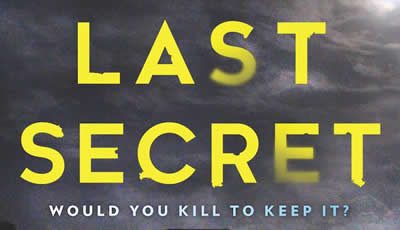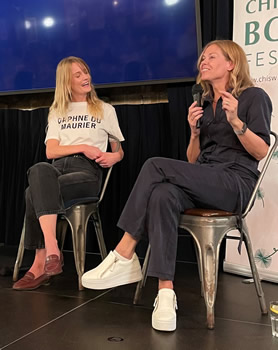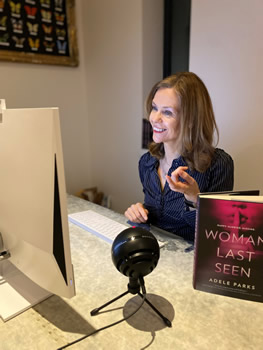

Features Up Close: Adele Parks
Temptation and a Twist of Fate
 By K.L. Romo
By K.L. Romo
“No little girl grows up dreaming of becoming an escort. A sex worker. A whore.”
Mothers will do the unimaginable to take care of their children. And that’s just what Dora has done for the last 12 years, since she gave birth to her baby girl. She started as a high-dollar escort, but that job slid into the job of a high-dollar prostitute.
But it was all worth it—she did it to survive.
In ONE LAST SECRET, bestselling author Adele Parks takes readers into one woman’s struggle to provide for her daughter, enduring the hardship. But at a cost.
It shocks Dora when her best friend, Evan, convinces her to end her high-dollar hooker job and start a new life with him. But what will people think of the prostitute and the insanely wealthy playboy? Does she even care?
When her manager calls with one last high-dollar job at an expensive French chateau—one that doesn’t involve sex—she takes it. But instead of the trip being the finalé to her career, it might just be the last performance of her life.
Parks takes readers into the life of a woman who does the unimaginable to take care of her child. We find ourselves wondering if we would be strong enough to do the same, given limited choices. Here, she chats with The Big Thrill about the idea for the novel, a mother’s devotion, and the revenge of moving on.
What was your inspiration for the story in ONE LAST SECRET?
I love the genre I write in, and I read a lot of psychological thrillers, domestic noir, and crime novels. However, I noticed a common trope in the role of a sex worker—she is a nameless body in the background: perhaps semi-clad on someone’s lap, perhaps grinding against a pole, sooner rather than later most probably found dead in a back alley.
For centuries, novels have depicted female sex workers as passive victims. Things happen to them—and rarely anything good. I wanted to explore what a sex worker might have to say for themselves, given a chance; the thought of giving them a voice inspired me. So in ONE LAST SECRET, I wrote a nuanced, complicated, compelling heroine who is a sex worker. And I allowed her to roar.
When mothers do whatever it takes to support their children, should people cheer them on or punish them for behaving badly?
This is a tricky case-by-case question. Parenting is such a complex job. Every single person on the planet is special to their family, but the truth is, we have to live within society and form harmonious communities. I believe a parent ought to support their child, but that doesn’t mean they ought to protect their child if the child does something criminal or cruel. A parent’s job is to guide their child through facing consequences.
A blinkered, extreme approach to protecting your own child, no matter what and above anyone else, will lead to a breakdown in society. If a parent does something illegal while sheltering their child, they must face the consequences. We can’t make excuses to get what we want from life without looking at the impact on others. Whatever actions anyone takes (no matter what their motivation is), they must deal with the aftermath.
What about second chances? Can someone go too far, past the point of forgiveness and reinvention?
I’m a very forgiving person and prone to holding out olive branches because I find it relatively easy to see other people’s points of view and can usually understand (if not agree with) why someone might do something wrong or ill-advised. I guess that’s an occupational hazard; writers ought to be empathetic. However, I’m no fool. I give second chances, but not a third, putting distance between myself and those who hurt me. I have no interest in retaliation—the best revenge is moving on and living well.
When someone is accustomed to being broke, how does the offer of a high-payout job lure them in, even if they no longer need the money?
I grew up in a household that accounted for every penny because whilst we weren’t poor—we had just enough to go around, sometimes enough for carefully meted-out treats—we were not wealthy. I have memories of my mother doing mental arithmetic in shops to determine if we could afford everything in the basket. Some weeks, she put grocery items back on the shelves, and she’d save until we could afford them. My parents bought nothing on credit, preferring to save for something special and then buy it.
A long car journey always had the added stress of wondering if our car would make it; holidays were not a given. I’m very comfortable now, but knowing how important it is to pay bills and squirrel something away in case of a rainy day has never left me. I never turn down work because no matter how successful and in demand I have become, part of me still feels grateful to have the work offered, and I’m nagged by fear that it might dry up.
If a person has endured extreme poverty, as Dora has, then the sense that money provides security amplifies well beyond logic. Someone who has been very poor can develop genuine anxiety about returning to that state and might very well accept a high-payout job (even a morally dubious one) because of fear.
What about that “thorny side of life” your characters portray?
Readers sometimes consider my characters challenging to like, but I promise they will fascinate! I insist on them being realistic and therefore flawed. Most of us are flawed (although to a lesser extent than my characters, I hope!). We are complex, irrational, and sometimes unreasonable. Good people do bad things, and bad people do good things.
Dora is an escort, and while I hope I explain her choices by providing a detailed insight into her past, many will find her line of work thorny to read about. Her work means she gets embroiled with some ruthless, dangerous people. Her life is far from a bed of roses.
Although most of us want a nice, comfortable life, reading about the thornier, darker “what if” moments make for exciting page-turners. It would be so bland to pick up a book where everyone was pleasant all the time and nothing dramatic ever happened. A novelist has to peek behind the curtains that are drawn around respectability.
Is there a message you’d like readers to take away from the book?
Foremost, I write to entertain, not teach or direct anyone’s moral compass. However, I’m excited when my book leaves a reader pondering, or moved, or with a perception shift or widening of perspective.
I knew nothing about high-end escorts when I started writing this novel, but through my research—meeting and interviewing women who are in this line of work—I think I became more compassionate. I still believe it’s an awful way to make a living, but I don’t have to; that’s the point. I’ve been blessed with choices and chances, supportive parents, and a good education. Many of the women I met during research have had none of that. It’s easy, although unproductive, to judge. Maybe we could put our energy into changing the conditions of women in this industry.
Tell us what’s been going on with the National Literacy Trust (NLT) and The Reading Agency.
Both charities address literacy. The NLT focuses on early years—primary and secondary education—and helping level-up our society by ensuring no child’s education is neglected and chasms don’t widen between those kids born into prosperity and those who are not. National lockdowns and partial school closures in response to the COVID-19 pandemic meant many children missed several months of school. This disruption to education is likely to leave a long legacy, particularly for children and young people from the most disadvantaged backgrounds.
NLT has concentrated on Education Recovery. They provide a range of evidence-based training, interventions, programs, and resources to support teachers and practitioners so children can move forward and develop their skills, literacy, and well-being.
The Reading Agency does support children, but perhaps their focus is more on teens and adult literacy. They run specific reading challenge programs to encourage the joy of reading through city councils, workplaces, and libraries.
Over the past 15 years, I’ve been involved with both charities. I take part in a hands-on way by running workshops for teens and young parents and visiting schools, educational centres, and workplaces to do talks. I also fundraise (I’ve even abseiled down a 30-story building and have taken part in fun runs and cake bakes). I am a spokesperson when needed, and I try to always be an ambassador by spreading the word about this astonishing and important work.
Reading is educational, yes, but it also improves mental health and empathy. I’m a big believer in how education can change worlds. Everyone should have fair access to the opportunities that occur by being a reader. I’m delighted if I can help facilitate that, even in a small way.
- Katherine Ramsland - April 25, 2024
- Flora Carr - March 29, 2024
- The Big Thrill Recommends: EVERYONE IS WATCHING by Heather Gudenkauf - March 29, 2024





